Project Management Principles: Skills, Traits & Reflection Report
VerifiedAdded on 2023/06/08
|10
|2440
|441
Report
AI Summary
This report investigates the five most significant skills required for successful project managers in the construction industry: communication, leadership, personal organization, risk and incident management, and negotiation. It discusses the difference between these skills and personal traits, arguing that some skills are learned while others are inherent personal qualities. The author reflects on their own performance as a project manager, identifying communication as a strength and highlighting the importance of project planning, work breakdown structures, cost accounts, schedule planning, and financial planning in achieving project success. The report concludes by emphasizing the use of Gantt charts and PERT charts for performance evaluation and project delivery.
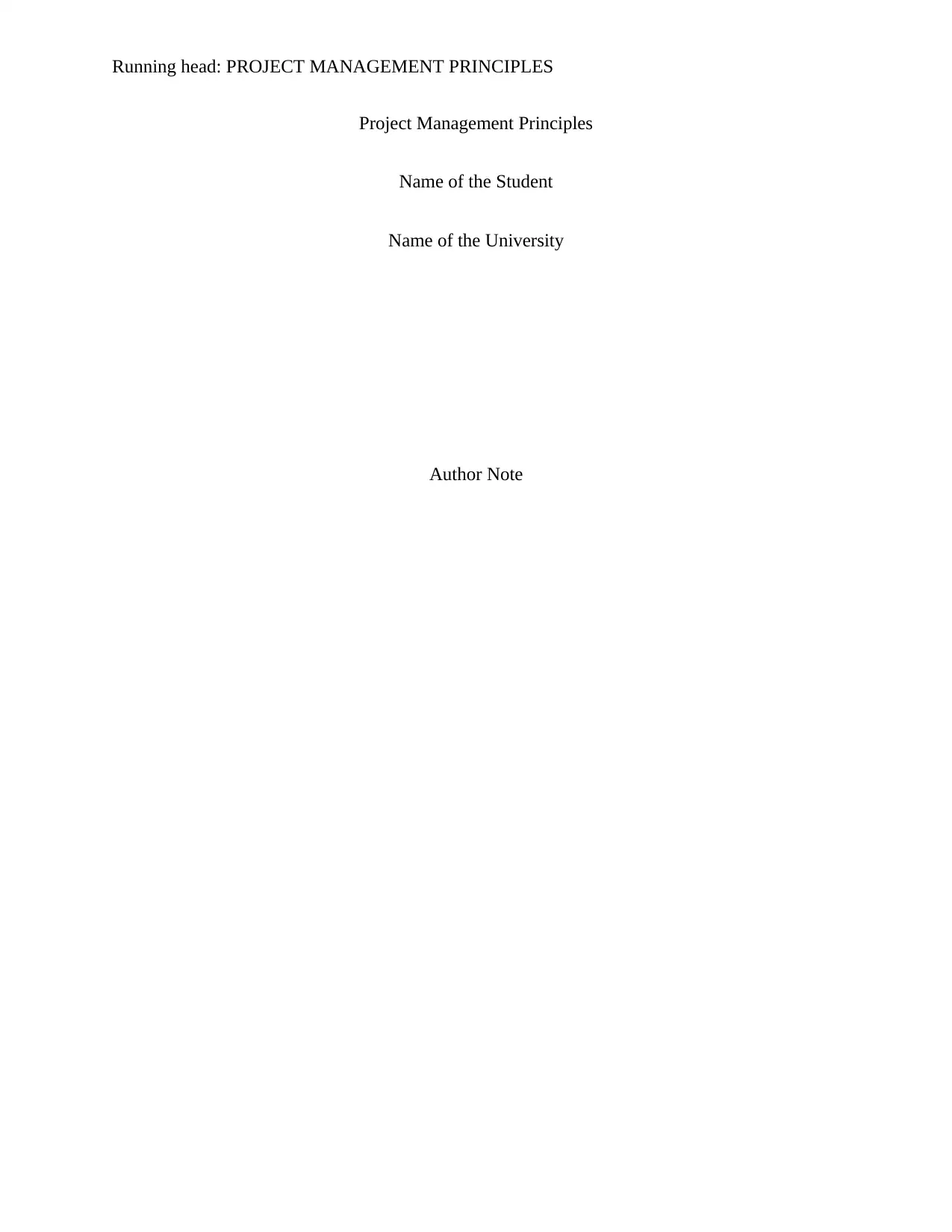
Running head: PROJECT MANAGEMENT PRINCIPLES
Project Management Principles
Name of the Student
Name of the University
Author Note
Project Management Principles
Name of the Student
Name of the University
Author Note
Paraphrase This Document
Need a fresh take? Get an instant paraphrase of this document with our AI Paraphraser
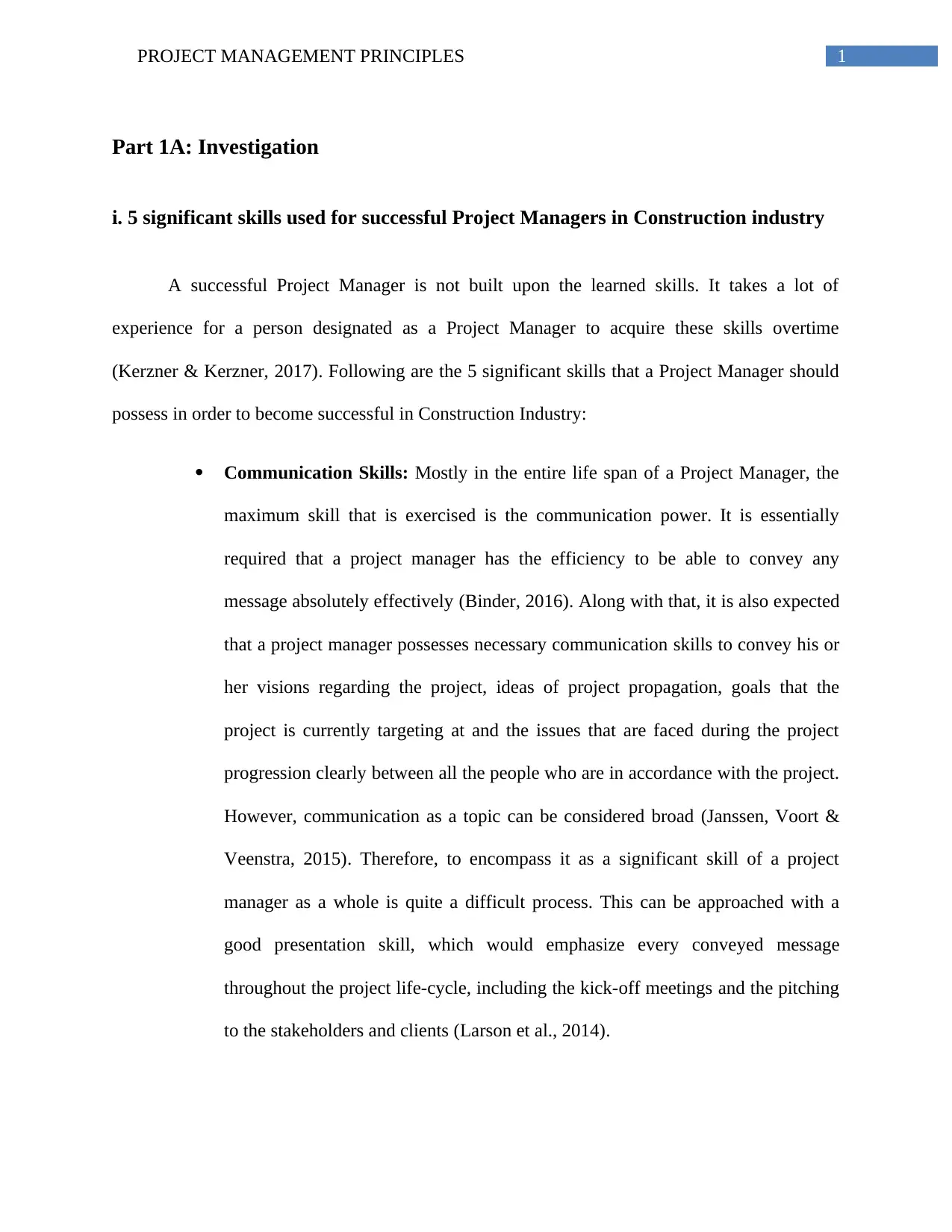
1PROJECT MANAGEMENT PRINCIPLES
Part 1A: Investigation
i. 5 significant skills used for successful Project Managers in Construction industry
A successful Project Manager is not built upon the learned skills. It takes a lot of
experience for a person designated as a Project Manager to acquire these skills overtime
(Kerzner & Kerzner, 2017). Following are the 5 significant skills that a Project Manager should
possess in order to become successful in Construction Industry:
Communication Skills: Mostly in the entire life span of a Project Manager, the
maximum skill that is exercised is the communication power. It is essentially
required that a project manager has the efficiency to be able to convey any
message absolutely effectively (Binder, 2016). Along with that, it is also expected
that a project manager possesses necessary communication skills to convey his or
her visions regarding the project, ideas of project propagation, goals that the
project is currently targeting at and the issues that are faced during the project
progression clearly between all the people who are in accordance with the project.
However, communication as a topic can be considered broad (Janssen, Voort &
Veenstra, 2015). Therefore, to encompass it as a significant skill of a project
manager as a whole is quite a difficult process. This can be approached with a
good presentation skill, which would emphasize every conveyed message
throughout the project life-cycle, including the kick-off meetings and the pitching
to the stakeholders and clients (Larson et al., 2014).
Part 1A: Investigation
i. 5 significant skills used for successful Project Managers in Construction industry
A successful Project Manager is not built upon the learned skills. It takes a lot of
experience for a person designated as a Project Manager to acquire these skills overtime
(Kerzner & Kerzner, 2017). Following are the 5 significant skills that a Project Manager should
possess in order to become successful in Construction Industry:
Communication Skills: Mostly in the entire life span of a Project Manager, the
maximum skill that is exercised is the communication power. It is essentially
required that a project manager has the efficiency to be able to convey any
message absolutely effectively (Binder, 2016). Along with that, it is also expected
that a project manager possesses necessary communication skills to convey his or
her visions regarding the project, ideas of project propagation, goals that the
project is currently targeting at and the issues that are faced during the project
progression clearly between all the people who are in accordance with the project.
However, communication as a topic can be considered broad (Janssen, Voort &
Veenstra, 2015). Therefore, to encompass it as a significant skill of a project
manager as a whole is quite a difficult process. This can be approached with a
good presentation skill, which would emphasize every conveyed message
throughout the project life-cycle, including the kick-off meetings and the pitching
to the stakeholders and clients (Larson et al., 2014).
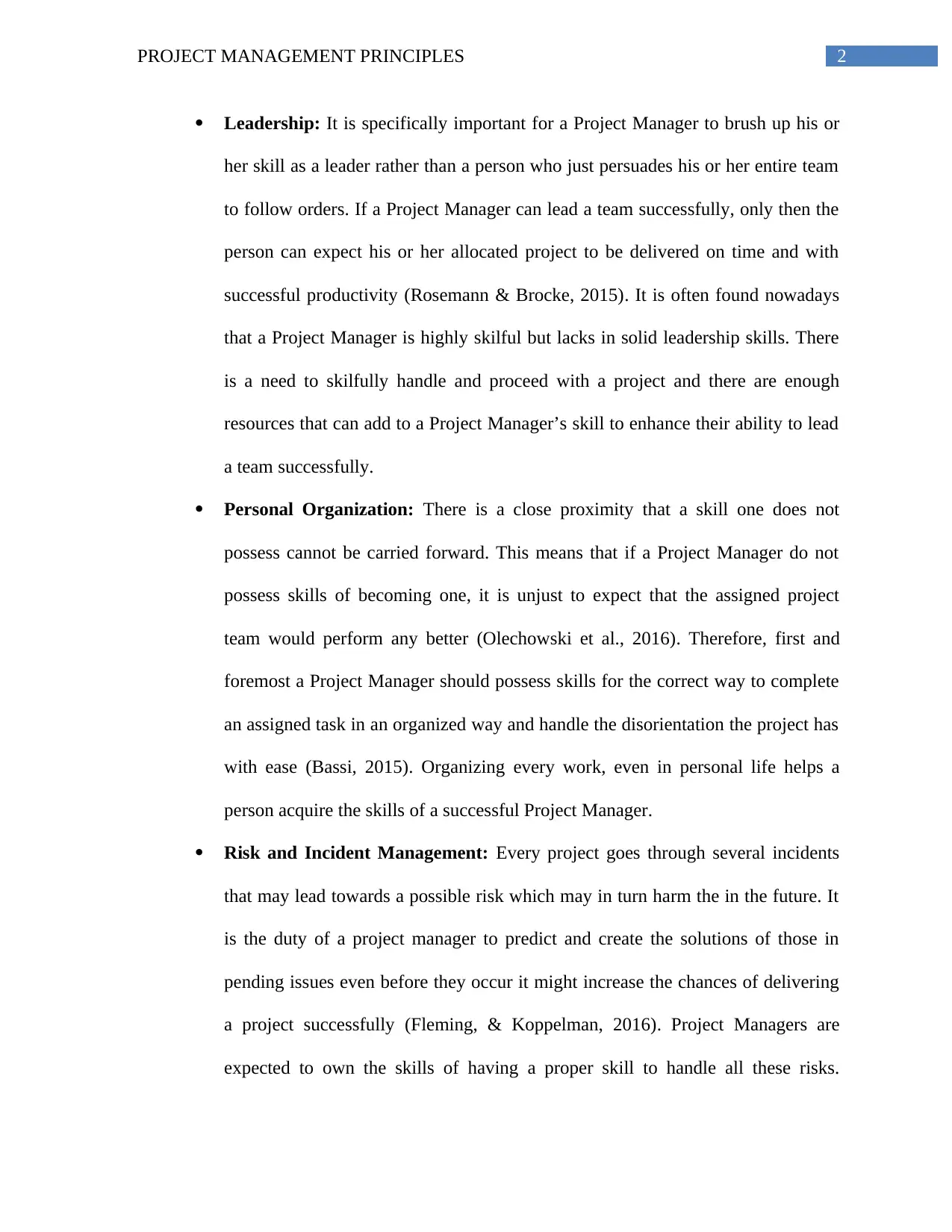
2PROJECT MANAGEMENT PRINCIPLES
Leadership: It is specifically important for a Project Manager to brush up his or
her skill as a leader rather than a person who just persuades his or her entire team
to follow orders. If a Project Manager can lead a team successfully, only then the
person can expect his or her allocated project to be delivered on time and with
successful productivity (Rosemann & Brocke, 2015). It is often found nowadays
that a Project Manager is highly skilful but lacks in solid leadership skills. There
is a need to skilfully handle and proceed with a project and there are enough
resources that can add to a Project Manager’s skill to enhance their ability to lead
a team successfully.
Personal Organization: There is a close proximity that a skill one does not
possess cannot be carried forward. This means that if a Project Manager do not
possess skills of becoming one, it is unjust to expect that the assigned project
team would perform any better (Olechowski et al., 2016). Therefore, first and
foremost a Project Manager should possess skills for the correct way to complete
an assigned task in an organized way and handle the disorientation the project has
with ease (Bassi, 2015). Organizing every work, even in personal life helps a
person acquire the skills of a successful Project Manager.
Risk and Incident Management: Every project goes through several incidents
that may lead towards a possible risk which may in turn harm the in the future. It
is the duty of a project manager to predict and create the solutions of those in
pending issues even before they occur it might increase the chances of delivering
a project successfully (Fleming, & Koppelman, 2016). Project Managers are
expected to own the skills of having a proper skill to handle all these risks.
Leadership: It is specifically important for a Project Manager to brush up his or
her skill as a leader rather than a person who just persuades his or her entire team
to follow orders. If a Project Manager can lead a team successfully, only then the
person can expect his or her allocated project to be delivered on time and with
successful productivity (Rosemann & Brocke, 2015). It is often found nowadays
that a Project Manager is highly skilful but lacks in solid leadership skills. There
is a need to skilfully handle and proceed with a project and there are enough
resources that can add to a Project Manager’s skill to enhance their ability to lead
a team successfully.
Personal Organization: There is a close proximity that a skill one does not
possess cannot be carried forward. This means that if a Project Manager do not
possess skills of becoming one, it is unjust to expect that the assigned project
team would perform any better (Olechowski et al., 2016). Therefore, first and
foremost a Project Manager should possess skills for the correct way to complete
an assigned task in an organized way and handle the disorientation the project has
with ease (Bassi, 2015). Organizing every work, even in personal life helps a
person acquire the skills of a successful Project Manager.
Risk and Incident Management: Every project goes through several incidents
that may lead towards a possible risk which may in turn harm the in the future. It
is the duty of a project manager to predict and create the solutions of those in
pending issues even before they occur it might increase the chances of delivering
a project successfully (Fleming, & Koppelman, 2016). Project Managers are
expected to own the skills of having a proper skill to handle all these risks.
⊘ This is a preview!⊘
Do you want full access?
Subscribe today to unlock all pages.

Trusted by 1+ million students worldwide
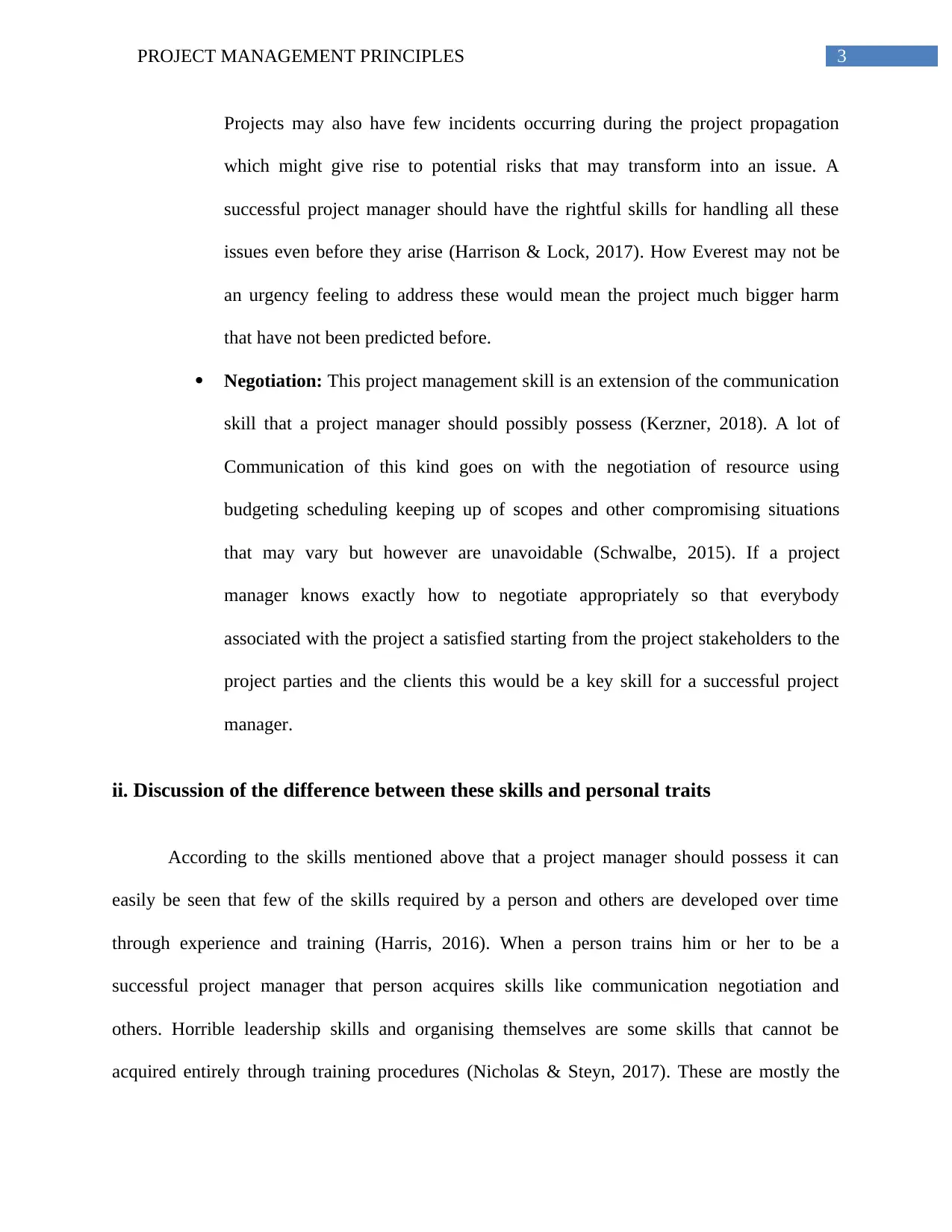
3PROJECT MANAGEMENT PRINCIPLES
Projects may also have few incidents occurring during the project propagation
which might give rise to potential risks that may transform into an issue. A
successful project manager should have the rightful skills for handling all these
issues even before they arise (Harrison & Lock, 2017). How Everest may not be
an urgency feeling to address these would mean the project much bigger harm
that have not been predicted before.
Negotiation: This project management skill is an extension of the communication
skill that a project manager should possibly possess (Kerzner, 2018). A lot of
Communication of this kind goes on with the negotiation of resource using
budgeting scheduling keeping up of scopes and other compromising situations
that may vary but however are unavoidable (Schwalbe, 2015). If a project
manager knows exactly how to negotiate appropriately so that everybody
associated with the project a satisfied starting from the project stakeholders to the
project parties and the clients this would be a key skill for a successful project
manager.
ii. Discussion of the difference between these skills and personal traits
According to the skills mentioned above that a project manager should possess it can
easily be seen that few of the skills required by a person and others are developed over time
through experience and training (Harris, 2016). When a person trains him or her to be a
successful project manager that person acquires skills like communication negotiation and
others. Horrible leadership skills and organising themselves are some skills that cannot be
acquired entirely through training procedures (Nicholas & Steyn, 2017). These are mostly the
Projects may also have few incidents occurring during the project propagation
which might give rise to potential risks that may transform into an issue. A
successful project manager should have the rightful skills for handling all these
issues even before they arise (Harrison & Lock, 2017). How Everest may not be
an urgency feeling to address these would mean the project much bigger harm
that have not been predicted before.
Negotiation: This project management skill is an extension of the communication
skill that a project manager should possibly possess (Kerzner, 2018). A lot of
Communication of this kind goes on with the negotiation of resource using
budgeting scheduling keeping up of scopes and other compromising situations
that may vary but however are unavoidable (Schwalbe, 2015). If a project
manager knows exactly how to negotiate appropriately so that everybody
associated with the project a satisfied starting from the project stakeholders to the
project parties and the clients this would be a key skill for a successful project
manager.
ii. Discussion of the difference between these skills and personal traits
According to the skills mentioned above that a project manager should possess it can
easily be seen that few of the skills required by a person and others are developed over time
through experience and training (Harris, 2016). When a person trains him or her to be a
successful project manager that person acquires skills like communication negotiation and
others. Horrible leadership skills and organising themselves are some skills that cannot be
acquired entirely through training procedures (Nicholas & Steyn, 2017). These are mostly the
Paraphrase This Document
Need a fresh take? Get an instant paraphrase of this document with our AI Paraphraser
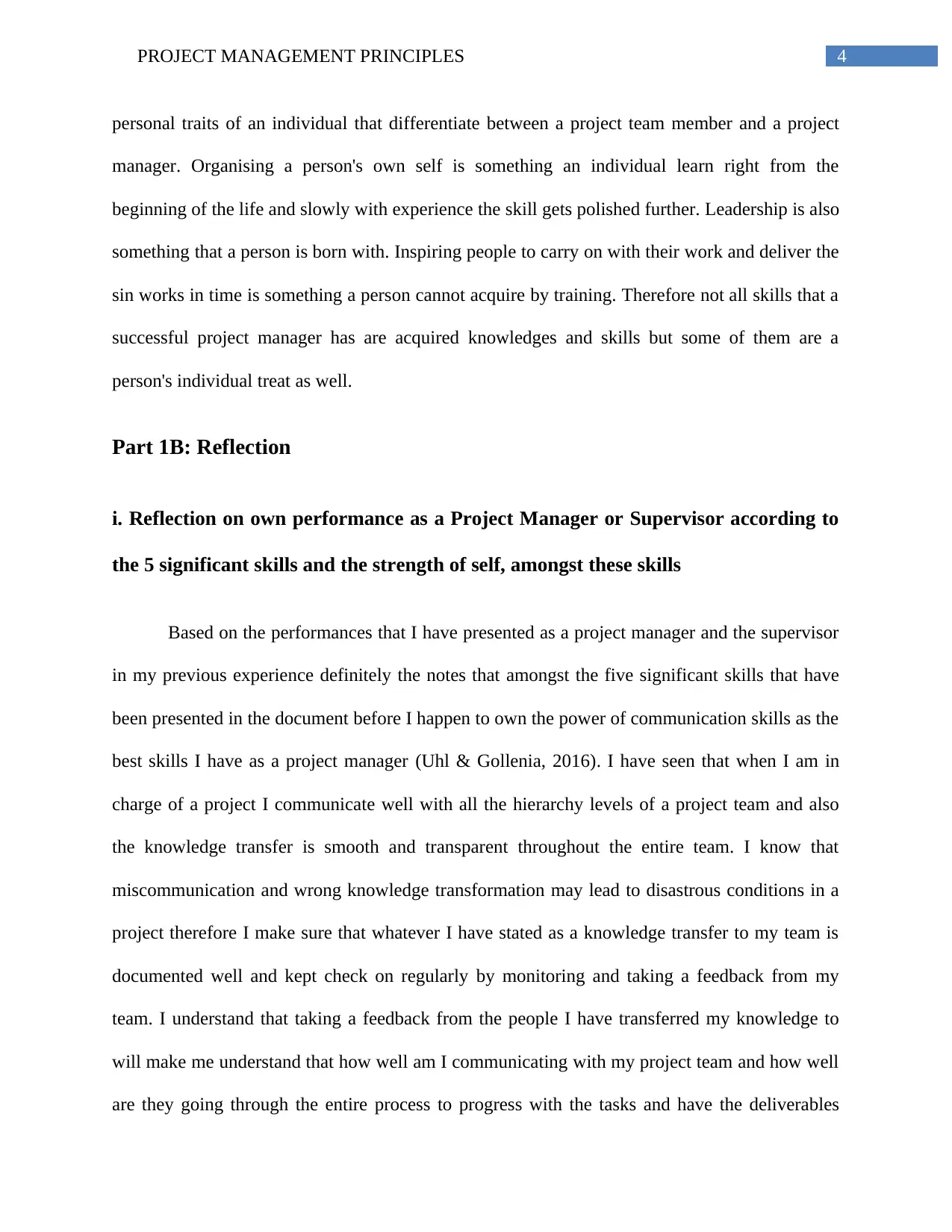
4PROJECT MANAGEMENT PRINCIPLES
personal traits of an individual that differentiate between a project team member and a project
manager. Organising a person's own self is something an individual learn right from the
beginning of the life and slowly with experience the skill gets polished further. Leadership is also
something that a person is born with. Inspiring people to carry on with their work and deliver the
sin works in time is something a person cannot acquire by training. Therefore not all skills that a
successful project manager has are acquired knowledges and skills but some of them are a
person's individual treat as well.
Part 1B: Reflection
i. Reflection on own performance as a Project Manager or Supervisor according to
the 5 significant skills and the strength of self, amongst these skills
Based on the performances that I have presented as a project manager and the supervisor
in my previous experience definitely the notes that amongst the five significant skills that have
been presented in the document before I happen to own the power of communication skills as the
best skills I have as a project manager (Uhl & Gollenia, 2016). I have seen that when I am in
charge of a project I communicate well with all the hierarchy levels of a project team and also
the knowledge transfer is smooth and transparent throughout the entire team. I know that
miscommunication and wrong knowledge transformation may lead to disastrous conditions in a
project therefore I make sure that whatever I have stated as a knowledge transfer to my team is
documented well and kept check on regularly by monitoring and taking a feedback from my
team. I understand that taking a feedback from the people I have transferred my knowledge to
will make me understand that how well am I communicating with my project team and how well
are they going through the entire process to progress with the tasks and have the deliverables
personal traits of an individual that differentiate between a project team member and a project
manager. Organising a person's own self is something an individual learn right from the
beginning of the life and slowly with experience the skill gets polished further. Leadership is also
something that a person is born with. Inspiring people to carry on with their work and deliver the
sin works in time is something a person cannot acquire by training. Therefore not all skills that a
successful project manager has are acquired knowledges and skills but some of them are a
person's individual treat as well.
Part 1B: Reflection
i. Reflection on own performance as a Project Manager or Supervisor according to
the 5 significant skills and the strength of self, amongst these skills
Based on the performances that I have presented as a project manager and the supervisor
in my previous experience definitely the notes that amongst the five significant skills that have
been presented in the document before I happen to own the power of communication skills as the
best skills I have as a project manager (Uhl & Gollenia, 2016). I have seen that when I am in
charge of a project I communicate well with all the hierarchy levels of a project team and also
the knowledge transfer is smooth and transparent throughout the entire team. I know that
miscommunication and wrong knowledge transformation may lead to disastrous conditions in a
project therefore I make sure that whatever I have stated as a knowledge transfer to my team is
documented well and kept check on regularly by monitoring and taking a feedback from my
team. I understand that taking a feedback from the people I have transferred my knowledge to
will make me understand that how well am I communicating with my project team and how well
are they going through the entire process to progress with the tasks and have the deliverables
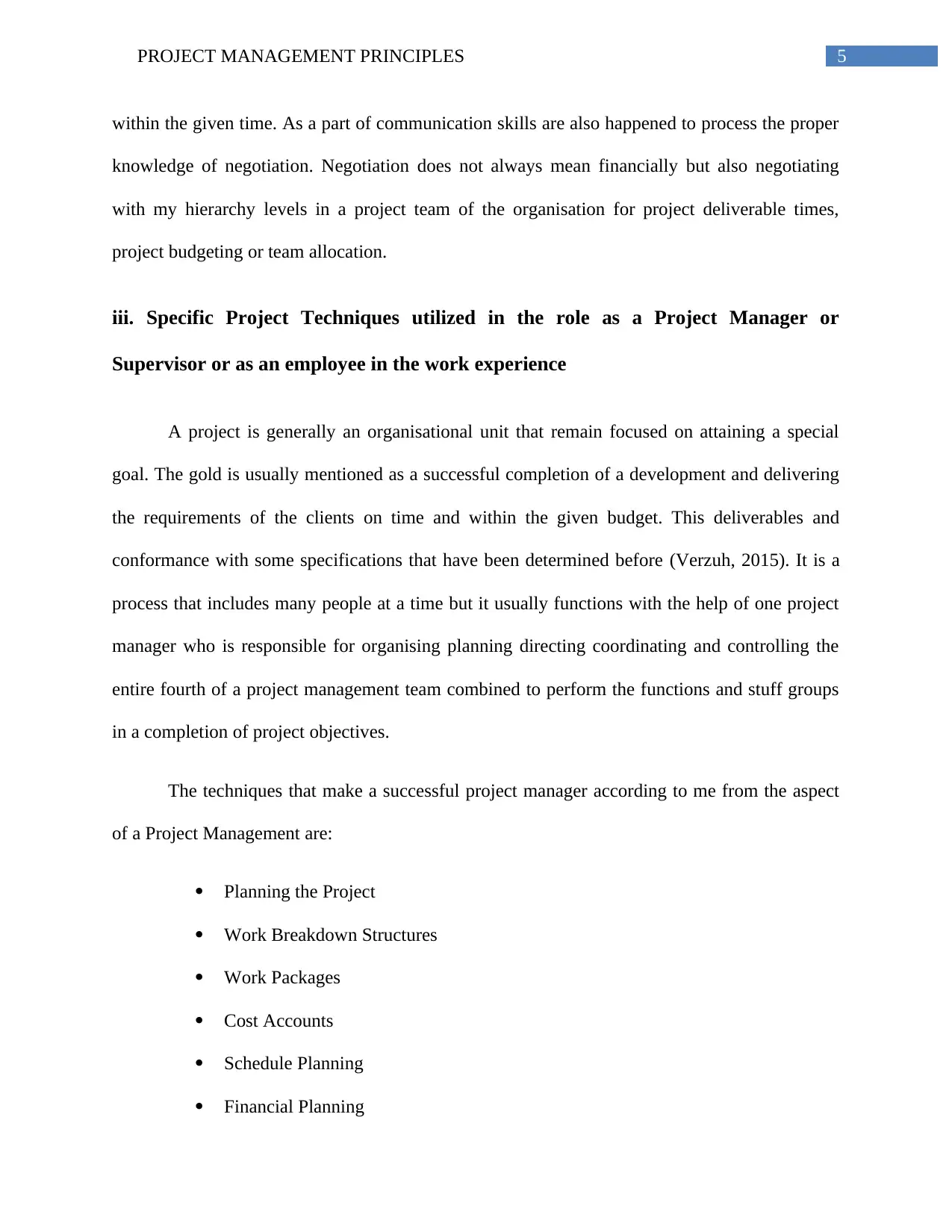
5PROJECT MANAGEMENT PRINCIPLES
within the given time. As a part of communication skills are also happened to process the proper
knowledge of negotiation. Negotiation does not always mean financially but also negotiating
with my hierarchy levels in a project team of the organisation for project deliverable times,
project budgeting or team allocation.
iii. Specific Project Techniques utilized in the role as a Project Manager or
Supervisor or as an employee in the work experience
A project is generally an organisational unit that remain focused on attaining a special
goal. The gold is usually mentioned as a successful completion of a development and delivering
the requirements of the clients on time and within the given budget. This deliverables and
conformance with some specifications that have been determined before (Verzuh, 2015). It is a
process that includes many people at a time but it usually functions with the help of one project
manager who is responsible for organising planning directing coordinating and controlling the
entire fourth of a project management team combined to perform the functions and stuff groups
in a completion of project objectives.
The techniques that make a successful project manager according to me from the aspect
of a Project Management are:
Planning the Project
Work Breakdown Structures
Work Packages
Cost Accounts
Schedule Planning
Financial Planning
within the given time. As a part of communication skills are also happened to process the proper
knowledge of negotiation. Negotiation does not always mean financially but also negotiating
with my hierarchy levels in a project team of the organisation for project deliverable times,
project budgeting or team allocation.
iii. Specific Project Techniques utilized in the role as a Project Manager or
Supervisor or as an employee in the work experience
A project is generally an organisational unit that remain focused on attaining a special
goal. The gold is usually mentioned as a successful completion of a development and delivering
the requirements of the clients on time and within the given budget. This deliverables and
conformance with some specifications that have been determined before (Verzuh, 2015). It is a
process that includes many people at a time but it usually functions with the help of one project
manager who is responsible for organising planning directing coordinating and controlling the
entire fourth of a project management team combined to perform the functions and stuff groups
in a completion of project objectives.
The techniques that make a successful project manager according to me from the aspect
of a Project Management are:
Planning the Project
Work Breakdown Structures
Work Packages
Cost Accounts
Schedule Planning
Financial Planning
⊘ This is a preview!⊘
Do you want full access?
Subscribe today to unlock all pages.

Trusted by 1+ million students worldwide
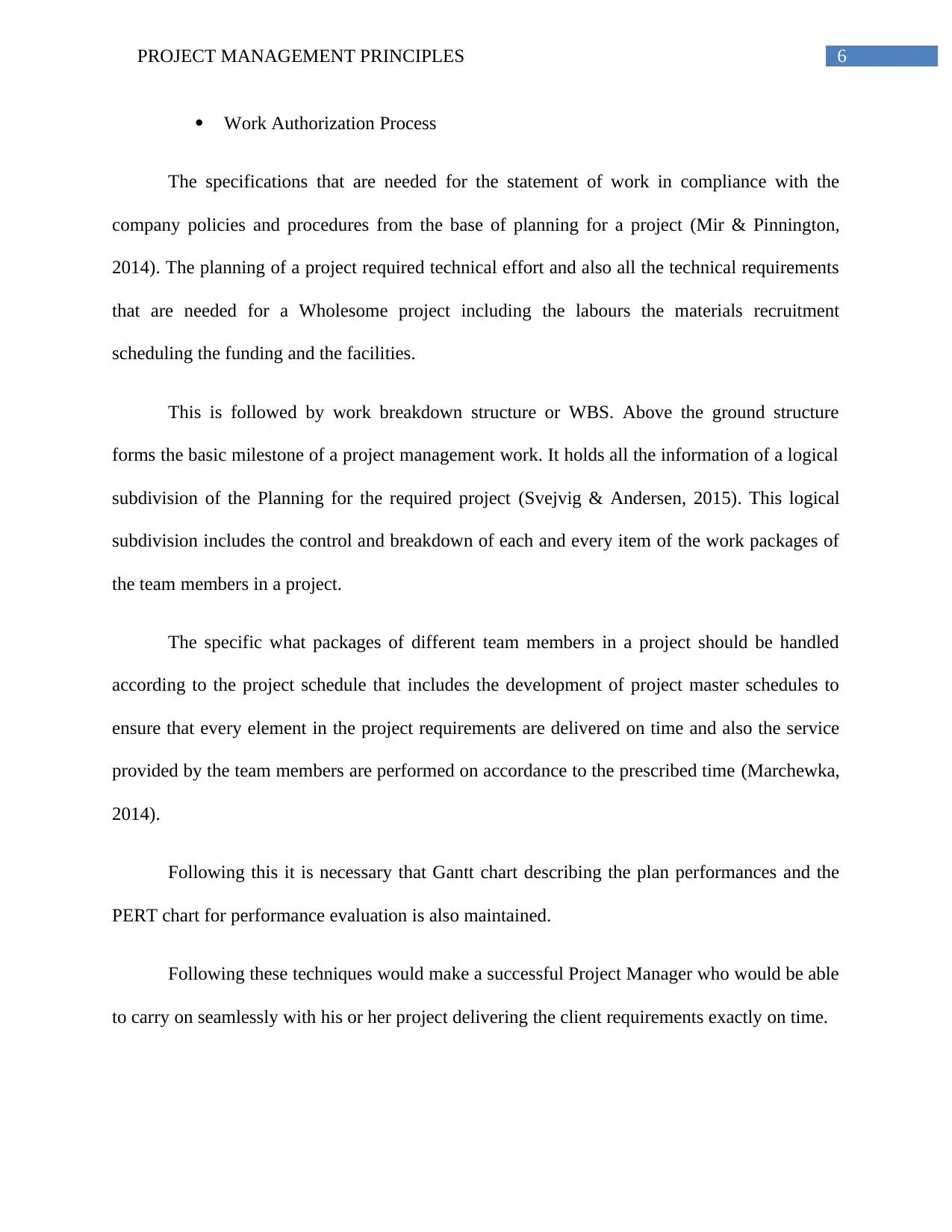
6PROJECT MANAGEMENT PRINCIPLES
Work Authorization Process
The specifications that are needed for the statement of work in compliance with the
company policies and procedures from the base of planning for a project (Mir & Pinnington,
2014). The planning of a project required technical effort and also all the technical requirements
that are needed for a Wholesome project including the labours the materials recruitment
scheduling the funding and the facilities.
This is followed by work breakdown structure or WBS. Above the ground structure
forms the basic milestone of a project management work. It holds all the information of a logical
subdivision of the Planning for the required project (Svejvig & Andersen, 2015). This logical
subdivision includes the control and breakdown of each and every item of the work packages of
the team members in a project.
The specific what packages of different team members in a project should be handled
according to the project schedule that includes the development of project master schedules to
ensure that every element in the project requirements are delivered on time and also the service
provided by the team members are performed on accordance to the prescribed time (Marchewka,
2014).
Following this it is necessary that Gantt chart describing the plan performances and the
PERT chart for performance evaluation is also maintained.
Following these techniques would make a successful Project Manager who would be able
to carry on seamlessly with his or her project delivering the client requirements exactly on time.
Work Authorization Process
The specifications that are needed for the statement of work in compliance with the
company policies and procedures from the base of planning for a project (Mir & Pinnington,
2014). The planning of a project required technical effort and also all the technical requirements
that are needed for a Wholesome project including the labours the materials recruitment
scheduling the funding and the facilities.
This is followed by work breakdown structure or WBS. Above the ground structure
forms the basic milestone of a project management work. It holds all the information of a logical
subdivision of the Planning for the required project (Svejvig & Andersen, 2015). This logical
subdivision includes the control and breakdown of each and every item of the work packages of
the team members in a project.
The specific what packages of different team members in a project should be handled
according to the project schedule that includes the development of project master schedules to
ensure that every element in the project requirements are delivered on time and also the service
provided by the team members are performed on accordance to the prescribed time (Marchewka,
2014).
Following this it is necessary that Gantt chart describing the plan performances and the
PERT chart for performance evaluation is also maintained.
Following these techniques would make a successful Project Manager who would be able
to carry on seamlessly with his or her project delivering the client requirements exactly on time.
Paraphrase This Document
Need a fresh take? Get an instant paraphrase of this document with our AI Paraphraser
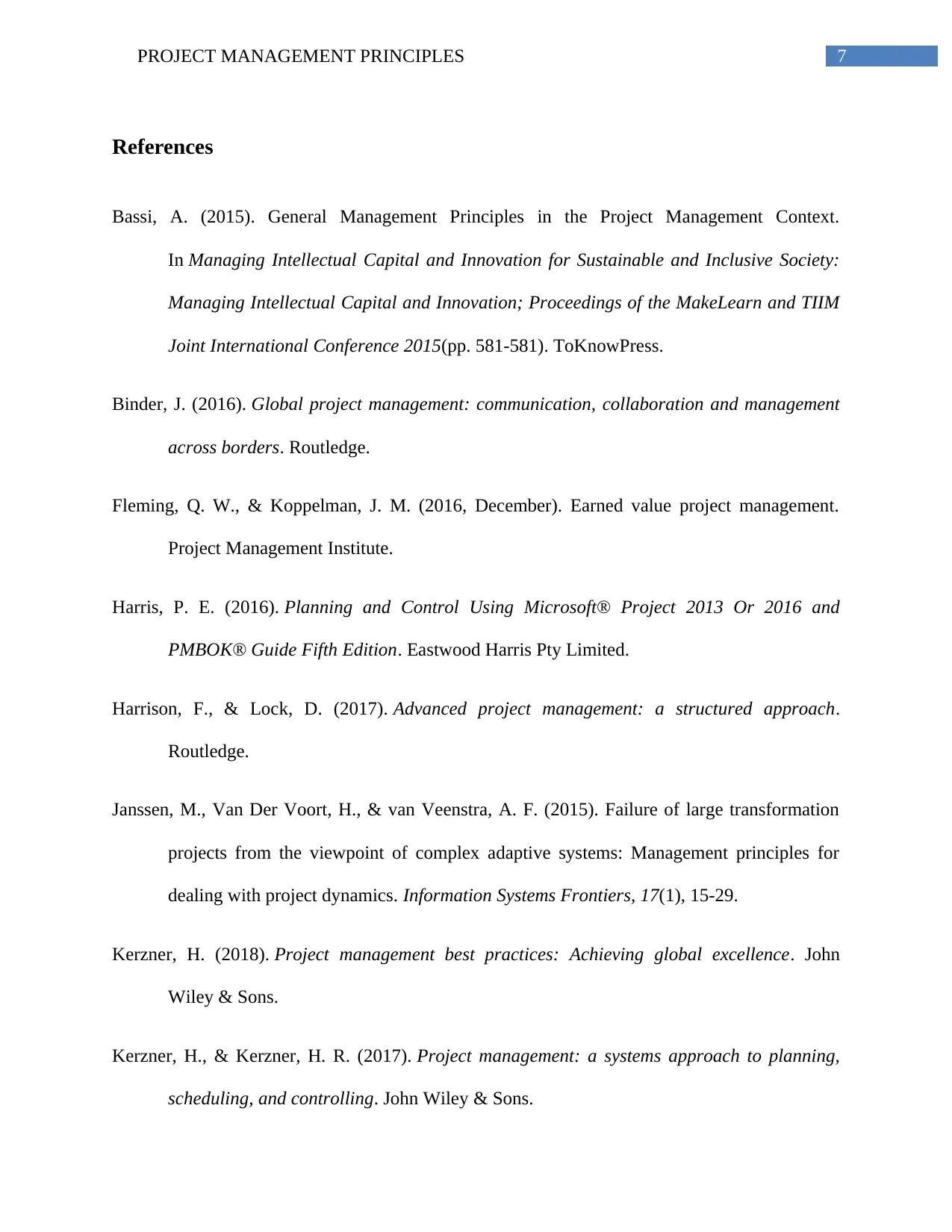
7PROJECT MANAGEMENT PRINCIPLES
References
Bassi, A. (2015). General Management Principles in the Project Management Context.
In Managing Intellectual Capital and Innovation for Sustainable and Inclusive Society:
Managing Intellectual Capital and Innovation; Proceedings of the MakeLearn and TIIM
Joint International Conference 2015(pp. 581-581). ToKnowPress.
Binder, J. (2016). Global project management: communication, collaboration and management
across borders. Routledge.
Fleming, Q. W., & Koppelman, J. M. (2016, December). Earned value project management.
Project Management Institute.
Harris, P. E. (2016). Planning and Control Using Microsoft® Project 2013 Or 2016 and
PMBOK® Guide Fifth Edition. Eastwood Harris Pty Limited.
Harrison, F., & Lock, D. (2017). Advanced project management: a structured approach.
Routledge.
Janssen, M., Van Der Voort, H., & van Veenstra, A. F. (2015). Failure of large transformation
projects from the viewpoint of complex adaptive systems: Management principles for
dealing with project dynamics. Information Systems Frontiers, 17(1), 15-29.
Kerzner, H. (2018). Project management best practices: Achieving global excellence. John
Wiley & Sons.
Kerzner, H., & Kerzner, H. R. (2017). Project management: a systems approach to planning,
scheduling, and controlling. John Wiley & Sons.
References
Bassi, A. (2015). General Management Principles in the Project Management Context.
In Managing Intellectual Capital and Innovation for Sustainable and Inclusive Society:
Managing Intellectual Capital and Innovation; Proceedings of the MakeLearn and TIIM
Joint International Conference 2015(pp. 581-581). ToKnowPress.
Binder, J. (2016). Global project management: communication, collaboration and management
across borders. Routledge.
Fleming, Q. W., & Koppelman, J. M. (2016, December). Earned value project management.
Project Management Institute.
Harris, P. E. (2016). Planning and Control Using Microsoft® Project 2013 Or 2016 and
PMBOK® Guide Fifth Edition. Eastwood Harris Pty Limited.
Harrison, F., & Lock, D. (2017). Advanced project management: a structured approach.
Routledge.
Janssen, M., Van Der Voort, H., & van Veenstra, A. F. (2015). Failure of large transformation
projects from the viewpoint of complex adaptive systems: Management principles for
dealing with project dynamics. Information Systems Frontiers, 17(1), 15-29.
Kerzner, H. (2018). Project management best practices: Achieving global excellence. John
Wiley & Sons.
Kerzner, H., & Kerzner, H. R. (2017). Project management: a systems approach to planning,
scheduling, and controlling. John Wiley & Sons.
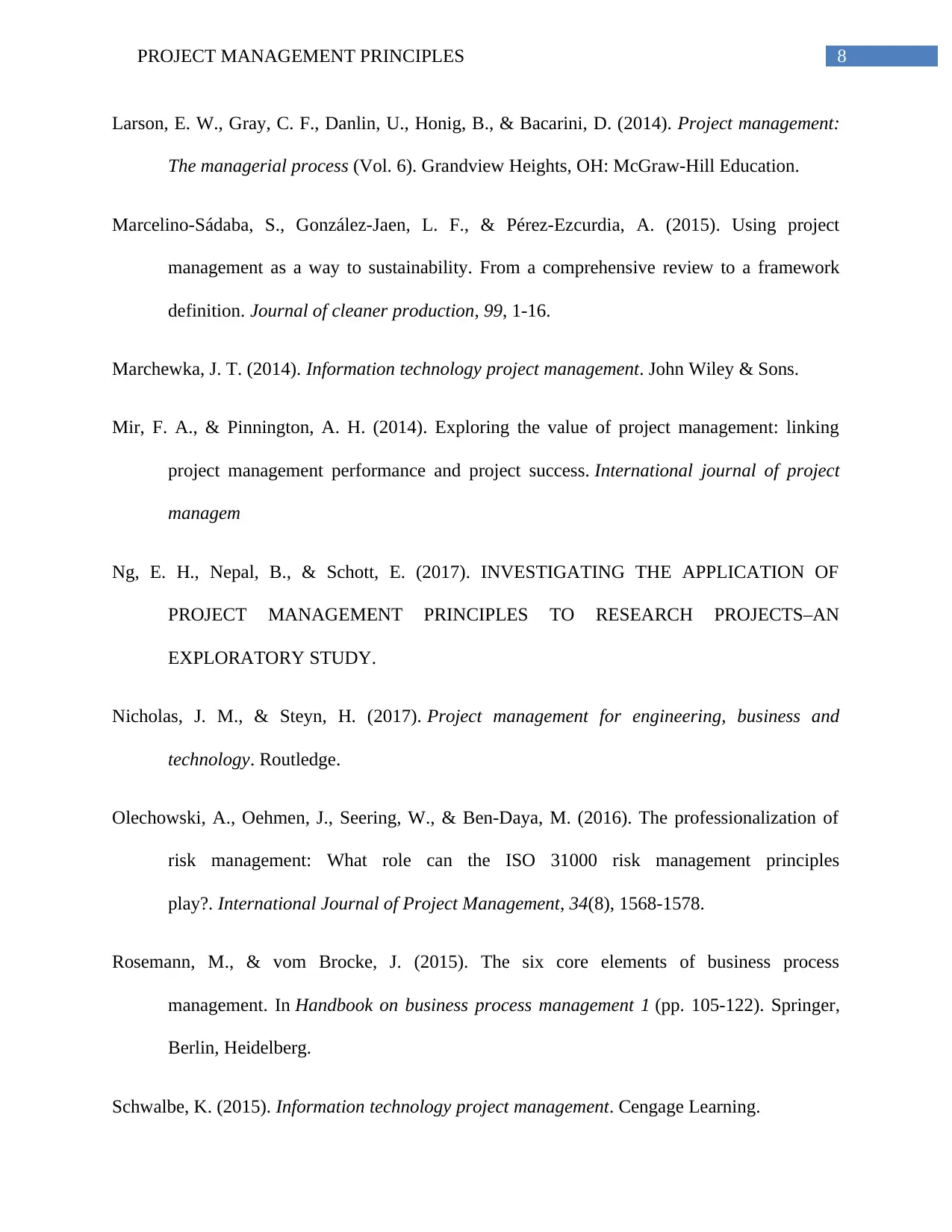
8PROJECT MANAGEMENT PRINCIPLES
Larson, E. W., Gray, C. F., Danlin, U., Honig, B., & Bacarini, D. (2014). Project management:
The managerial process (Vol. 6). Grandview Heights, OH: McGraw-Hill Education.
Marcelino-Sádaba, S., González-Jaen, L. F., & Pérez-Ezcurdia, A. (2015). Using project
management as a way to sustainability. From a comprehensive review to a framework
definition. Journal of cleaner production, 99, 1-16.
Marchewka, J. T. (2014). Information technology project management. John Wiley & Sons.
Mir, F. A., & Pinnington, A. H. (2014). Exploring the value of project management: linking
project management performance and project success. International journal of project
managem
Ng, E. H., Nepal, B., & Schott, E. (2017). INVESTIGATING THE APPLICATION OF
PROJECT MANAGEMENT PRINCIPLES TO RESEARCH PROJECTS–AN
EXPLORATORY STUDY.
Nicholas, J. M., & Steyn, H. (2017). Project management for engineering, business and
technology. Routledge.
Olechowski, A., Oehmen, J., Seering, W., & Ben-Daya, M. (2016). The professionalization of
risk management: What role can the ISO 31000 risk management principles
play?. International Journal of Project Management, 34(8), 1568-1578.
Rosemann, M., & vom Brocke, J. (2015). The six core elements of business process
management. In Handbook on business process management 1 (pp. 105-122). Springer,
Berlin, Heidelberg.
Schwalbe, K. (2015). Information technology project management. Cengage Learning.
Larson, E. W., Gray, C. F., Danlin, U., Honig, B., & Bacarini, D. (2014). Project management:
The managerial process (Vol. 6). Grandview Heights, OH: McGraw-Hill Education.
Marcelino-Sádaba, S., González-Jaen, L. F., & Pérez-Ezcurdia, A. (2015). Using project
management as a way to sustainability. From a comprehensive review to a framework
definition. Journal of cleaner production, 99, 1-16.
Marchewka, J. T. (2014). Information technology project management. John Wiley & Sons.
Mir, F. A., & Pinnington, A. H. (2014). Exploring the value of project management: linking
project management performance and project success. International journal of project
managem
Ng, E. H., Nepal, B., & Schott, E. (2017). INVESTIGATING THE APPLICATION OF
PROJECT MANAGEMENT PRINCIPLES TO RESEARCH PROJECTS–AN
EXPLORATORY STUDY.
Nicholas, J. M., & Steyn, H. (2017). Project management for engineering, business and
technology. Routledge.
Olechowski, A., Oehmen, J., Seering, W., & Ben-Daya, M. (2016). The professionalization of
risk management: What role can the ISO 31000 risk management principles
play?. International Journal of Project Management, 34(8), 1568-1578.
Rosemann, M., & vom Brocke, J. (2015). The six core elements of business process
management. In Handbook on business process management 1 (pp. 105-122). Springer,
Berlin, Heidelberg.
Schwalbe, K. (2015). Information technology project management. Cengage Learning.
⊘ This is a preview!⊘
Do you want full access?
Subscribe today to unlock all pages.

Trusted by 1+ million students worldwide
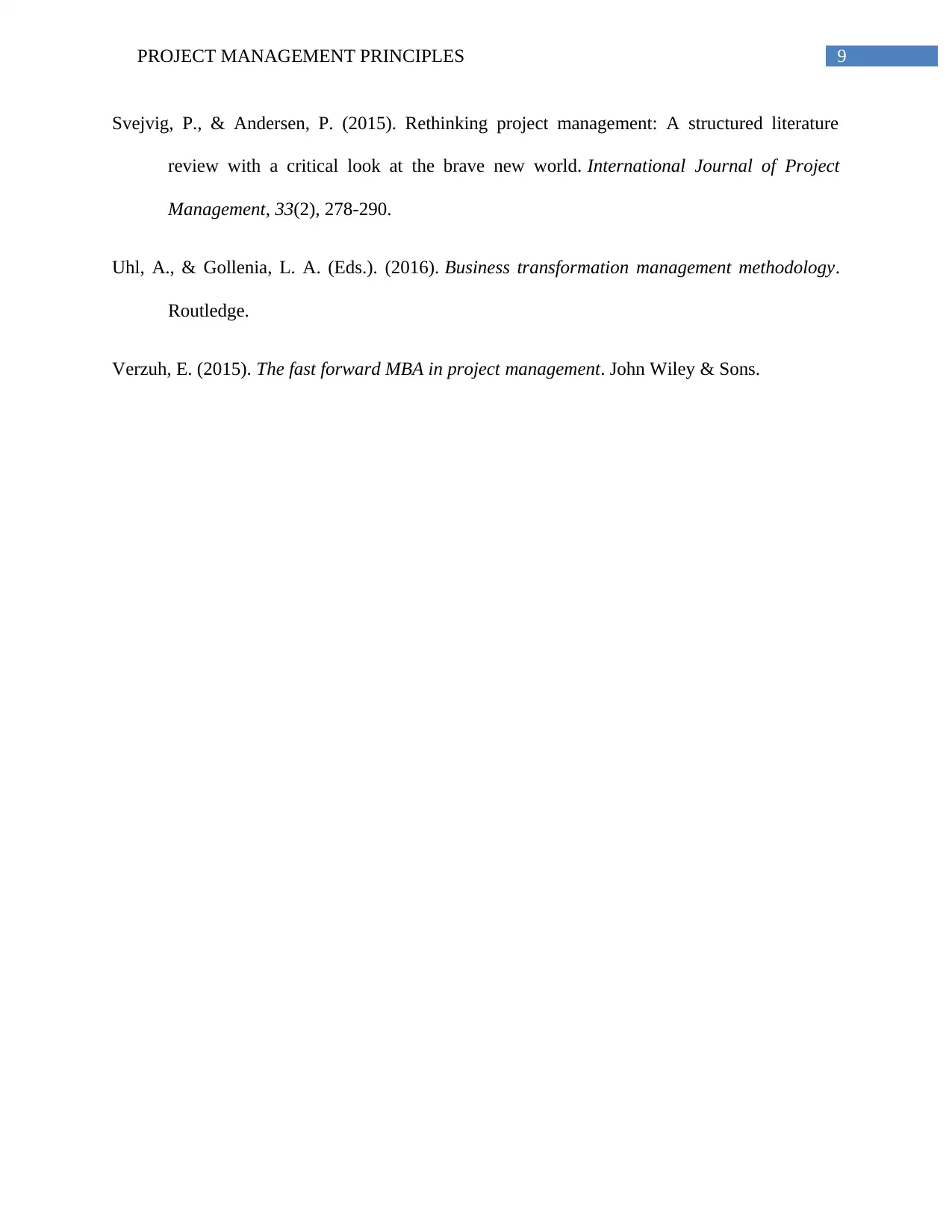
9PROJECT MANAGEMENT PRINCIPLES
Svejvig, P., & Andersen, P. (2015). Rethinking project management: A structured literature
review with a critical look at the brave new world. International Journal of Project
Management, 33(2), 278-290.
Uhl, A., & Gollenia, L. A. (Eds.). (2016). Business transformation management methodology.
Routledge.
Verzuh, E. (2015). The fast forward MBA in project management. John Wiley & Sons.
Svejvig, P., & Andersen, P. (2015). Rethinking project management: A structured literature
review with a critical look at the brave new world. International Journal of Project
Management, 33(2), 278-290.
Uhl, A., & Gollenia, L. A. (Eds.). (2016). Business transformation management methodology.
Routledge.
Verzuh, E. (2015). The fast forward MBA in project management. John Wiley & Sons.
1 out of 10
Related Documents
Your All-in-One AI-Powered Toolkit for Academic Success.
+13062052269
info@desklib.com
Available 24*7 on WhatsApp / Email
![[object Object]](/_next/static/media/star-bottom.7253800d.svg)
Unlock your academic potential
Copyright © 2020–2026 A2Z Services. All Rights Reserved. Developed and managed by ZUCOL.



